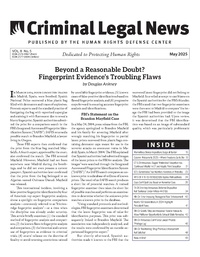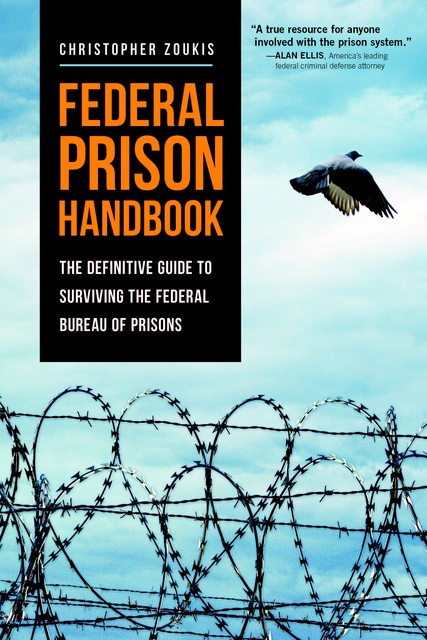by Douglas Ankney
In March 2004, four commuter trains in Madrid, Spain, were bombed. Spain’s National Police recovered a blue plastic bag filled with detonators and traces of explosives. Forensic experts used the standard practice of fumigating the bag with vaporized superglue and staining it with fluorescent dye …
by David Kim
Travelers entering the United States are facing intensifying scrutiny—not just of their luggage but of their smartphones, laptops, and other digital devices—as border agents increasingly conduct warrantless searches, sometimes copying personal data for further analysis. Civil liberties groups and legal experts argue these practices erode …
“There is no greater tyranny than that which is perpetrated under the shield of the law and in the name of justice.”
—Montesquieu, Enlightenment philosopher
Wondering what to expect from the government in 2025?
So far, it looks like it will be more of the same …
by Douglas Ankney
The Supreme Court of Connecticut held that the principles set forth in State v. Dickson, 141 A.3d 810 (Conn. 2016), cert. denied, 582 U.S. 922 (2017), regarding eyewitness identification apply retroactively on collateral review. In doing so, the Court also ruled that the “watershed rule” …
by James Mills
U.S. Immigration and Customs Enforcement (“ICE”) has developed a powerful surveillance tool that allows analysts to extract metadata from hundreds of websites, apps, and platforms, enabling the agency to gather detailed information on individuals, likely to aid in arrests, deportations, and visa enforcement.
ICE’s …
by Sagi Schwartzberg
The Supreme Court of Arkansas, in two companion cases, held that there was no designation in Appellant’s sentencing order to § 16-93-609 of the Arkansas Code Annotated (“ACA”), and thus, he was entitled to have his parole eligibility recalculated under Act 683.
Background
…
by Michael Dean Thompson
In forensic technology, the term “black box” has gained prominence. It describes a system whose inner workings remain opaque—an output emerges, but how it is produced eludes the user. Such black-box algorithms underpin artificial intelligence (“AI”) tools that identify suspects from video footage, guide …
by David Kim
From the earliest forms of human communication, deception has been an inescapable part of social interaction. People lie—frequently and for countless reasons. Studies indicate that the average person tells at least two lies per day, and in a typical 10-minute conversation, 60% of individuals will …
by Anthony W. Accurso
Federal law enforcement agencies have been paying private companies for the information they collect on users—information for which agents would need a warrant to collect themselves.
The U.S. Supreme Court ruled in Carpenter v. United States, 585 U.S. 296 (2018), that the government …
by Jo Ellen Nott
New research from Flinders University in South Australia, published in Forensic Chemistry, reveals a troubling public health risk: cars used for smoking, manufacturing, or transporting methamphetamine harbor significant drug residues, exposing future occupants to third-hand contamination. Testing on two used vehicles detected meth in …
by James Mills
Footage from police body cameras could soon become a pricey commodity in Ohio. Ohio has joined Arizona and Indiana on the short list of states that allow police departments to charge citizens, lawyers, journalists, and activists to access bodycam footage.
In Arizona, the charge …
by James Mills
Artificial intelligence has exceeded human capabilities in yet another area.
AI has surpassed human forensic experts in determining biological sex from skeletal remains. Forensic anthropologists traditionally analyze human skeletons to estimate age, lifestyle, and sex—key information for criminal investigations, identifying remains, archaeology, and paleoanthropology. …
by Anthony W. Accurso
An open-source initiative is empowering citizens to monitor automated license plate readers (“ALPRs”) worldwide, cataloging their locations to reveal how police and private companies deploy these surveillance tools.
Flock Safety (“Flock”), a leading ALPR vendor in the United States, markets its technology as …
by David M. Reutter
The Court of Criminal Appeals of Texas held that a deferred disposition or adjudication is not a “sentence” within the meaning of an authorized appeal by the State under Tex. Crim. Code Proc. art. 44.01(b). The Court resolved a statewide split among the state’s …
by James Mills
The United States Department of the Treasury’s Financial Crimes Enforcement Network (“FinCEN”) has announced a new rule that lowers the currency transaction report (“CTR”) limit to $200 for certain counties along the Southwest border of the U.S.
The normal threshold to generate a CTR …
by Jo Ellen Nott
Connecticut is confronting its history of wrongful convictions by compensating victims and reforming police procedures. The state has moved to award $37.6 million to eight wrongfully convicted men who collectively spent 151 years behind bars. The legislature’s Judiciary Committee ratified this compensation on February …
by James Mills
The NYPD now has Drone First Responders (“DFRs”) and has begun deploying them in response to 911 calls. On Nov. 13, 2024, the Mayor’s office announced the new program: 10 drones, deployed across three boroughs—Brooklyn, the Bronx, and Manhattan—remotely dispatched to fly autonomously to the …
by Michael Dean Thompson
Support for the death penalty among Americans has fallen to 53%, its lowest level since 1972, driven primarily by younger generations who are far less likely to favor capital punishment for convicted murderers, according to a Gallup poll.
Gallup’s annual Crime Survey, conducted …
by Anthony W. Accurso
The Metropolitan Police Department (“MPD”) in Washington, D.C., has spent hundreds of thousands of dollars to monitor social media activity, targeting protesters and others not suspected of crimes, according to public records obtained through a 2022 lawsuit by the Brennan Center for Justice and …
by Jo Ellen Nott
The shoplifting crisis dominating recent news may be exaggerated, but it has delivered major wins for police departments nationwide.
An investigation by The Appeal on March 27, 2025, reveals that fears over so-called “organized retail crime” have given law enforcement a pretext to …
by Douglas Ankney
The United States Court of Appeals for the Fourth Circuit held that the U.S. District Court for the Middle District of North Carolina erred when it failed to make the requisite particularized findings required under U.S. Sentencing Guidelines (“U.S.S.G.”) § 1B1.3(a)(1)(B) before imposing the three-level …
by David Kim
In 2024, 147 prisoners were exonerated for crimes they did not commit, an alarming number that underscores both the resilience of those wrongfully convicted and the systemic failures that led to their imprisonment. The National Registry of Exonerations (“Registry”) documented these cases in its annual …
by Sagi Schwartzberg
The United States Court of Appeals for the Ninth Circuit ruled that Eugene Allen Doerr satisfied the criteria set forth in Rhines v. Weber, 544 U.S. 269 (2005), for granting a stay and abeyance of his federal habeas petition to allow exhaustion of his claims …
by Michael Dean Thompson
A San Diego-based company called ANOM, often stylized as “ANØM,” distributed encrypted phones worldwide. These devices were stripped down, hardened against intrusion, and designed to allow messaging only between phones on the same closed network. Unbeknownst to users, the FBI intercepted every communication.
…
by Sagi Schwartzberg
The U.S. Court of Appeals for the Ninth Circuit held that an attorney cannot be compelled to provide a “privilege log” to the Government relating to documents protected under the Fifth Amendment’s act-of-production privilege.
Background
During an investigation of an alleged tax evasion …
by David M. Reutter
The United States Court of Appeals for the Fifth Circuit held that the U.S. District Court for the Eastern District of Louisiana erred in applying an offense-level enhancement for maintaining a premises for the purposes of manufacturing or distributing a controlled substance based solely …
Loaded on
April 15, 2025
published in Criminal Legal News
May, 2025, page 49
Alabama: According to the Tuscaloosa Thread,a Tuscaloosa Police Officer was fired and arrested after child pornography was found on his electronic devices. The Tuscaloosa Police Department (“TPD”) announced that the West Alabama Human Trafficking Task Force began to investigate TPD officer Corey Nicholas Burcham, 35, in September 2024. Investigators …






